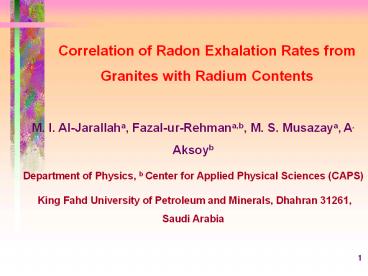Radiation%20Quantities%20and%20Units - PowerPoint PPT Presentation
Title:
Radiation%20Quantities%20and%20Units
Description:
Radon exhalation rates for 152 samples of granite tiles used in Saudi Arabia were determined ... The radon exhalation rates measured by the active technique ... – PowerPoint PPT presentation
Number of Views:146
Avg rating:3.0/5.0
Title: Radiation%20Quantities%20and%20Units
1
Correlation of Radon Exhalation Rates from
Granites with Radium Contents
M. I. Al-Jarallaha, Fazal-ur-Rehmana,b, M. S.
Musazaya, A. Aksoyb Department of Physics, b
Center for Applied Physical Sciences (CAPS) King
Fahd University of Petroleum and Minerals,
Dhahran 31261, Saudi Arabia
2
ABSTRACT
- Radon exhalation rates for 152 samples of granite
tiles used in Saudi Arabia were determined - Active and passive measuring techniques were used
in this study. - In the active technique, a PC-based radon gas
analyzer with emanation container was used. - In the passive technique, CR-39 nuclear track
detectors with the Can technique were applied
for 30 days. - Radium contents of 21 samples of granite tiles
were measured using HPGe-based gamma spectroscopy - The radon exhalation rates measured by the active
technique showed a good linear correlation with
radium content (R2 0.9).
3
- Fig. 1. Schematic diagram showing the active
set-up used for the exhalation measurements
of samples with AlphaGUARD.
4
- Fig 2. A PC-based Active Radon Measuring System
containing radon gas analyzer type AlphaGUARD
2000 PRQ along with emanation container.
5
Activity (Bq m-3)
Time (h)
- Fig. 3 Buildup of radon exhaled from a granite
sample measured by the active system. The x-axis
shows the real time of buildup while the y-axis
shows the radon concentration in the container.
The bold line shows the log fit.
6
- Fig. 4. Frequency distribution of radon
exhalation rate measurements from the granite
tiles using the active technique.
7
Fig. 5. Schematic diagram showing the passive
setup where an NTD is placed on the
surface of granite tile and surrounded by a
sealed vessel
8
- Fig. 6 Photograph showing the can technique
where two cans, enclosing the NTDs, are placed on
two locations of the surface of each granite
tile.
9
Fig. 7
10
- Fig. 8 Track density in the NTDs is being
measured using an optical microscope associated
with Image Analyzing System.
11
- Fig. 9 Correlation of track production rate
(passive technique) and radon exhalation rate
(active technique) measurements from granite
tiles.
12
Fig. 10 Correlation between activity of radon
emanated per unit mass and the actual radium
content (Ra Rn).
13
Table 1 The Increment in the radon
concentration (Bq m-3) due to the presence of
tiles for maximum and average exhalation rates at
ventilation rates of 0 and 0.1 h-1.
f 0 f 0.1 h-1 Ratio (f0/f0.1)
?C for Emax (Bq m-3) 467 35 13
?C for ESH (Bq m-3) 290 22 13
?C for Eave (Bq m-3) 60 4.5 13
14
CONCLUSION
- It was found that all building materials exhale
radon with a very wide range. - 2. Most of granites showed relatively higher
radon exhalation rates (lt0.12 to 10.6 Bq m-2
h-1). - 3. The reproducibility measurements of the radon
exhalation rates with both the passive and active
techniques for granite tiles were found 7 and 5
respectively. - 4. A correlation was found between radon
exhalation rate and the radium content (R2 0.9). - The contribution of building materials of high
radon exhalation rates in indoor radon
concentration can be significant. up to 470 Bq
m-3, for the - highest radon exhalation and zero ventilation.
- Regular ventilation is very effective in reducing
radon concentration ( A ventilation of 0.1 h-1
reduces radon concentration from 470 to 35 Bq
m-3). - Most users of granite are unaware of its Uranium
content and are unable to measure its radon
exhalation rates. Therefore, we suggest adding
extra information to the identification of
granites, namely its Uranium content and radon
exhalation rate and this should be accessible to
the users.
15
Thank you































